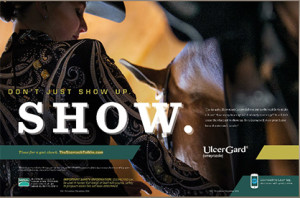Do You Have the Stomach to Win?
Winning in the Show Ring Takes Dedication, Hard Work
Dressage. Barrel racing. Western Pleasure.
Quarter Horse. Warmblood. Arabian.
Texas. Florida. Virginia.
No matter the discipline, breed or geographic area, competitive horse people have one thing in common – they want to win.
In a new video launched by Merial, makers of ULCERGARD® (omeprazole), the message is all about what happens behind the scenes before competitive horses and riders ever enter a show pen, ride a cross-country course or run a barrel pattern. View the video at TheStomachToWin.com.
“Many of us in the equine group at Merial compete, so we understand the kind of effort, dedication and commitment it takes to be successful – regardless of the breed of the horse or type of competition,” says Beckie Peskin, Senior Product Manager, Equine. “There is one aspect of showing horses that is common to everyone – the amount of work it takes and the desire to win. That’s what we wanted to capture in this video.”
The new video is part of a “Winning” campaign for ULCERGARD, which also includes new print and website advertisements featuring the riders and horses in the video.
Horse enthusiasts know winning in the ring depends heavily on a very lopsided ratio of preparation hours to actual showing hours. And they also know that being successful comes as a result of a comprehensive approach to competing.
Ryan Strand is a third-generation horse trainer and owner, along with his wife, Elise, of Liberty Meadows Training Center, one of the locations used in the video. He says the preparation of horse and rider for competition is complicated and requires attention to every detail.
“For riders, it depends a lot on their skill level and attitude,” he says. “Each one is different, and requires a little different approach. Some riders I have to explain in great detail what I’m asking them to do. With others, it’s more intuitive. But they all ride for one reason – to win.”
For horses, Strand says a health care program is just as important as his training and conditioning program. That health care includes good nutrition, proper shoeing, monitoring for potential lameness and being proactive. “You can have the most talented and willing horse in the show ring, but if something is bothering that horse, the performance will be lacking,” he says.
One of the most common health challenges that can impede the performance of a competitive horse is stomach ulcers, with two out of three nonracing competitive horses having been shown to have them.1 To help prevent them from occurring and increase the odds of having a “winning” performance, Strand says he uses ULCERGARD a few days before and during competitions.* ULCERGARD is the only proven and FDA-approved product for the prevention of equine stomach ulcers.2
Ensuring horses have the stomach to win is just one component of a winning strategy. Visit thestomachtowin.com for more information.
*Proven to effectively prevent gastric ulcers in horses exposed to stressful conditions when administered for 8 or 28 days.
IMPORTANT SAFETY INFORMATION:
ULCERGARD can be used in horses that weigh at least 600 pounds. Safety in pregnant mares has not been determined.
®ULCERGARD is a registered trademark of Merial. ©Merial Limited, Duluth, GA. All rights reserved. EQUIUGD1434 (08/19)
1Mitchell RD. Prevalence of gastric ulcers in hunter/jumper and dressage horses evaluated for poor performance. Association for Equine Sports Medicine, September 2001.
2ULCERGARD product label.











